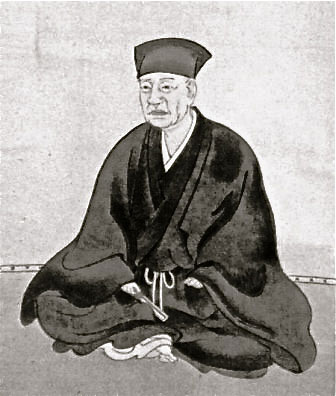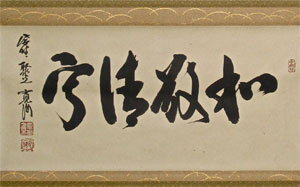What is Chado?
The act of serving a guest a bowl of tea along with a sweet is, at its core, a simple act of hospitality. Serving tea and refreshments to a guest is an elemental act of hospitality. In Japan over the last five centuries, this most basic practice has evolved into a rich tradition of social communion, art, design, and spirituality, called chado — the Way of Tea. This term "the way of tea", also known as "Japanese Tea Ceremony", emphasizes that studying tea is an ongoing practice, a way of life, and a means of seeing the world anew.
Students of the way of tea learn temae — the procedures of preparing and serving sweets and tea — as well as guests' behaviors for receiving tea and appreciating all the details of the tea event in, a mindful manner that focuses all the participants on the present moment and place. While at its heart, the most important aspect of the way of tea remains the simple and sincere exchange of refreshment between host and guest, tea study also encompasses art, architecture, literature, zen philosophy, history, and the crafts of metal, wood, bamboo work, ceramics, flower arrangement, textiles, and incense appreciation.
Sen no Rikyu
 The Way of Tea as it is practiced today by the Boston Urasenke group traces its legacy to the 16th century tea master Sen no Rikyu. Sen no Rikyu established a heavily zen-inflected style of tea called wabicha, which distinguished itself from grander styles of tea by emphasizing simplicity and directness, as well as use of the old, broken, and imperfect, which themselves became highly prized for their uniqueness and the subtle beauty to be found in textures, accidents, and repairs. Rikyu served as tea master to the samurai leader Toyotomi Hideyoshi and inspired a great number of followers, until his death in 1591 at the age of 70. The current 16th generation Urasenke Grand Master, Zabosai Iemoto, traces his lineage directly to Sen no Rikyu.
The Way of Tea as it is practiced today by the Boston Urasenke group traces its legacy to the 16th century tea master Sen no Rikyu. Sen no Rikyu established a heavily zen-inflected style of tea called wabicha, which distinguished itself from grander styles of tea by emphasizing simplicity and directness, as well as use of the old, broken, and imperfect, which themselves became highly prized for their uniqueness and the subtle beauty to be found in textures, accidents, and repairs. Rikyu served as tea master to the samurai leader Toyotomi Hideyoshi and inspired a great number of followers, until his death in 1591 at the age of 70. The current 16th generation Urasenke Grand Master, Zabosai Iemoto, traces his lineage directly to Sen no Rikyu.
Four Principles of Tea

Wa – Harmony: In the tea space, all strive to come together in harmony, setting aside our differences and working to achieve mutual understanding amongst diverse individuals.
Kei – Respect: Tea practitioners show respect for each other, but also for objects, traditions and history. We cultivate a mindfulness that enables us to treat people, things and idea with care and consideration.
Sei – Purity: We practice purity and clarity of intention, which also extends to the care and cleanliness with which we treat objects, surroundings and guests.
Jaku – Tranquility: Through these practices, we aim to achieve tranquility – a state of peace, finding balance in a chaotic world through the cultivation of purity, respect and harmony.
Rikyu's Seven Precepts
Making a delicious bowl of tea is more than just using high quality tea and following the correct procedures. A guest's true satisfaction while having a bowl of tea comes from the host's hospitality and sincerity.
Traditionally, burning charcoal is used to heat the water used for tea. The charcoal must be placed precisely to encourage air flow and to prevent the fire from extinguishing prematurely.
When displaying flowers for tea, the host must try to showcase the flowers' natural beauty. For example, the host may choose flowers that are notable for growing during the current season to allow them to be appreciated in the tea room.
The host's primary focus should be making his guest comfortable. With deliberate choices for the day's utensils, scroll, sweets, and other items, the host provides the guest with both imagery and sensations to complement the season's natural warmth or coolness.
In tea as in life, time is a precious resource. The host must be efficient with his preparations, and the guest should be mindful to arrive ahead of the appointed time.
More than just for rain, the host must simply be prepared for anything. One cannot know when something unexpected will happen, and the host must be able to respond with inner calm in any situation.
Showing a considerate attitude is as important for the host as it is for the guests. It is only by showing each other mutual respect both in and out of the tea room that we can build positive and long-lasting relationships.
 Urasenke Boston
Urasenke Boston
